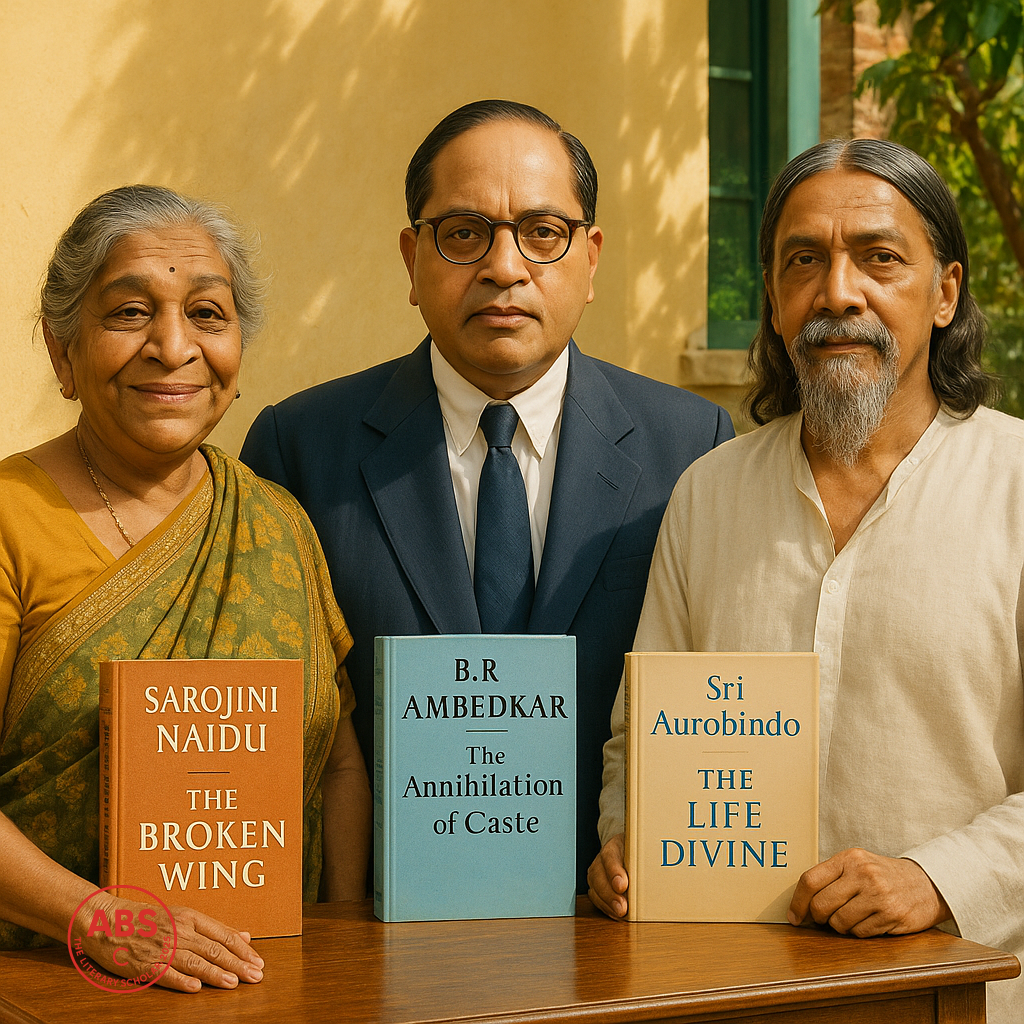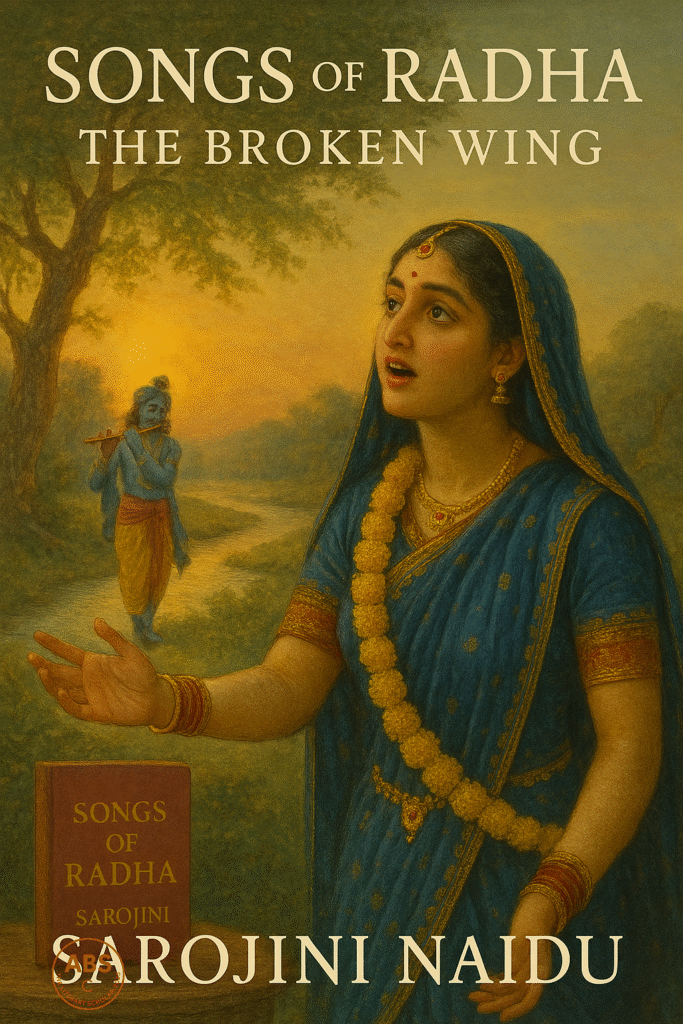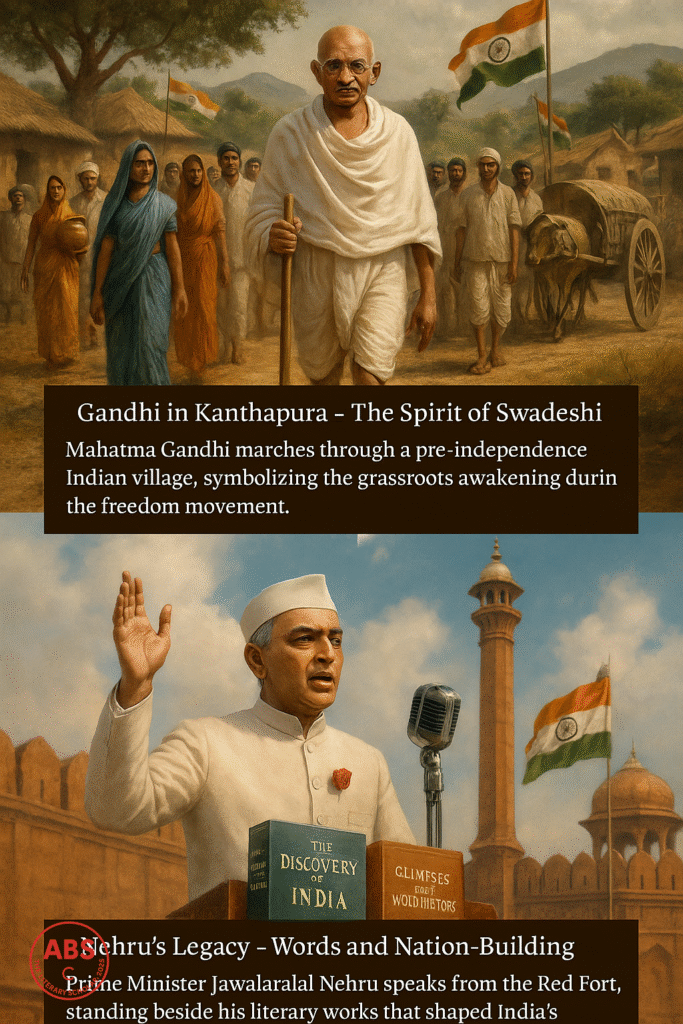Tagore, Gandhi, Nehru, Sarojini Naidu, and the literary roots of India’s independence movement
By ABS, The Literary Scholar, who believes that sometimes revolutions begin with a salt march, and sometimes with a sentence.
Before Salman Rushdie made English magical, and long before Arundhati Roy made it Booker-worthy, a curious tribe of patriots, poets, philosophers, and politicians had already smuggled English into Indian soil—not through literary agents, but through manifestos and metaphor. They were not writing for editors. They were writing for emancipation.
In today’s terms, this was the original Indian English crossover episode. And what a cast.
They didn’t just fight colonialism with marches and slogans. They fought it with verse, diaries, philosophical digressions, and deeply wordy introspection. Some wielded walking sticks and khadi; others wore robes and metaphysical flair. And nearly all of them had a strong opinion on nationalism, poetry, and why the British needed a one-way ticket home.
Rabindranath Tagore: The Nobel Laureate Who Made Spiritual Confusion Fashionable
Let’s begin, inevitably, with Rabindranath Tagore, the only man who could win a Nobel Prize in Literature and still be casually accused of writing “too many poems about God and gardens.”
Tagore wasn’t a writer. He was a one-man publishing house, complete with in-house philosophy, built-in music, and compulsory melancholy. With works like Gitanjali, he introduced the West to a version of India where the soul sighed gently under a banyan tree, waiting for the divine.
“Where the mind is without fear and the head is held high…”
Yes, Tagore. But also where the sentence never ends and the metaphor refuses to land.
His English was unmistakably Indian—not because of any grammar slips (there weren’t any), but because it felt like someone was whispering the Upanishads in iambic pentameter.
And yet, for all his ethereal imagery, Tagore was no armchair aesthete. He returned his knighthood after the Jallianwala Bagh massacre. He built schools, argued with Gandhi, and somehow managed to write about fifty-two lifetimes’ worth of literature in one go.
His poetry was political by being personal, devotional by being defiant. If you read him right, he wasn’t just dreaming—he was diagnosing the Empire with spiritual bankruptcy.
Mahatma Gandhi: The Minimalist Memoirist Who Wrote Like He Walked—Slow and With Conviction
Next up, the man whose prose marched as famously as he did: Mohandas Karamchand Gandhi.
Let’s be clear: Gandhi didn’t write novels, and his poetry was mostly unintentional. But Hind Swaraj and The Story of My Experiments with Truth remain some of the most oddly gripping things ever written about spinning wheels, salt, and soul-searching.
His sentences were as simple as his spectacles—but don’t be fooled. There’s something lethal about a man who says:
“An eye for an eye will leave the whole world blind.”
And then proceeds to dismantle an empire—one hand-written prayer at a time.
Gandhi’s English had no flair, and that was the flair. It was like khadi prose—unadorned, hand-spun, morally upright, and slightly itchy. But in that simplicity was an ethic. You couldn’t quote Gandhi and then misbehave. It would be stylistically awkward.
In today’s literary terms, Gandhi was the original practitioner of “show, don’t tell”—except he also showed, told, spun cotton, and occasionally went on hunger strikes just to make sure you were paying attention.
Jawaharlal Nehru: The Man Who Wrote India Into Existence (in Velvet Prose)
And then came Pandit Jawaharlal Nehru—a man who could write sentences so beautiful, they made the idea of planned economy sound almost romantic.
Nehru’s The Discovery of India is what happens when a statesman gets too much time in jail with a good vocabulary. It is part autobiography, part political treatise, part sweeping civilizational history—and entirely drenched in rhetorical charm.
“A moment comes, which comes but rarely in history…”
That’s not just a line. That’s an entry pass to a nation being born in real time—with Nehru as the MC and reluctant messiah.
His Glimpses of World History, written as letters to his daughter Indira, are the literary equivalent of a Netflix docuseries meets parenting manual, directed by a man who once argued for socialism in four languages.
Where Gandhi’s English was humble, Nehru’s was suave. He wrote like a man educated at Harrow and Cambridge, but dreaming in Sanskrit epics. You could almost hear the conflict—an elite mind trying to serve a barefoot nation. He made English part of India’s intellectual scaffolding, not its ceiling.
Sarojini Naidu: The Nightingale Who Sang Between Protests
Now let’s talk about someone who rhymed her way through rallies—Sarojini Naidu, the “Nightingale of India,” whose poetry had a habit of slipping into anthologies and political meetings without missing a beat.
Her collections like The Golden Threshold and The Bird of Time weren’t just decorative—they were deceptively potent. Yes, she wrote about bangle sellers and bazaars. But she also slipped in freedom, feminism, and fierce nationalism with the stealth of a literary ninja.
“Men call you fair, and fair you are, but eyes are blind that do not see…”
(That’s a love poem. Also possibly a metaphor for colonial blindness. Coincidence? Unlikely.)
Naidu was the rare figure who could deliver a poetic reading and a scathing speech, all before tea break. She fought for women’s rights, represented India at international conferences, and made English her silk-sari’d accomplice.
And yes, her poems had rhythm, rhyme, and all the elegance of pre-independence Urdu-Hindi-English cross-cultural harmony. She was literature’s graceful middle finger to imperial condescension.
Dr. B.R. Ambedkar: The Intellectual Sledgehammer Who Made Sentences Feel Like Verdicts
Enter now the man who never intended to be lyrical, but somehow wrote with the force of thunder—Dr. B.R. Ambedkar. He didn’t write at the British. He wrote beyond them, for a future that would still be catching up.
His Annihilation of Caste is one of the most devastating texts ever produced in English by an Indian. It reads like a lawsuit, a sermon, and a revolution all at once.
“Caste is not a physical object like a wall of bricks or a line of barbed wire which prevents the Hindus from co-mingling and which has, therefore, to be pulled down.”
Try reading that without straightening your spine. Ambedkar’s English didn’t meander—it prosecuted. He had no time for metaphor when injustice was so literal.
His style was formal, exact, and terrifyingly rational. It didn’t need poetic flourish because it came with statistical receipts. He made Parliament feel like a classroom and classrooms feel like courts of law.
Where Tagore wanted transcendence, Ambedkar wanted structural change. His English was not spiritual—it was surgical.
Sri Aurobindo: The Philosopher-Poet Who Moonlighted as a Revolutionary Mystic
Lastly, if you’re looking for someone who wrote The Life Divine before brunch and still managed to smuggle bombs in his youth, look no further than Sri Aurobindo.
He started off throwing shade at the British via fiery essays in Bande Mataram, then shifted gears and started throwing shade at materialism via metaphysical epics. His transition from political rebel to spiritual sage wasn’t so much a shift as an upgrade.
His English is not for the faint of vocabulary. Reading Savitri feels like falling into a cosmic abyss wrapped in rhyming couplets. It’s long. It’s dense. It’s about everything and nothing and the universe and your inner self and possibly your neighbor’s cat.
“Man is a transitional being; he is not final.”
Of course he isn’t, Sri Aurobindo. Neither are your sentences.
And yet, he carved a space for Indian spirituality in English that still echoes in ashrams, classrooms, and YouTube guided meditations.
What These Writers Gave Us
They gave us English with a conscience. Before it became a literary medium, it was a language of rebellion, vision, and alternative futures. They wrote not to impress but to awaken.
Some wrote to heal (Tagore), some to provoke (Ambedkar), some to lead (Nehru), some to confess (Gandhi), and some to serenade while marching for independence (Naidu).
Together, they made Indian English Literature not just a postcolonial flourish—but a pre-independence fire.
And though they weren’t “novelists” in the strict sense, they gave the next generation something far more valuable: permission.
Permission to use the colonizer’s language and still sound like themselves. Permission to be angry, poetic, political, spiritual—or all of it at once. They wrote the prologue so that others could write the plot.
As the scroll folds itself shut, ABS imagines Nehru composing an essay while Gandhi fasts nearby, Tagore humming a Gitanjali verse in a robe, and Sarojini slipping poetic innuendos into speeches, as Ambedkar marks up a constitutional draft with the fury of five centuries. The words still echo—not as nostalgia, but as inheritance.

Signed,
ABS
The Literary Scholar
Who believes revolutions were once written in longhand, bound in cloth, and smuggled under the arm like poetry in motion



Share this post / Spread the witty word / Let the echo wander / Bookmark the brilliance
